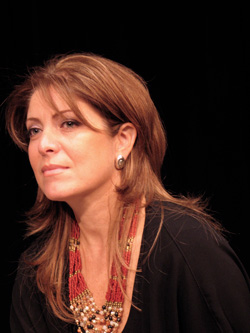Fadia el-Hage Voice

She is one of the very few singers mastering and combining
the traditions of Western and Mid-Eastern classical music.
Her repertoire extends from classical Arab music,
European music from the Middle Ages
to Contemporary music.
Biography
Fadia El-Hage (alto) was born in Beirut, Lebanon. Shestarted her musical career at the age of fourteen as a singer
with the Rahbani brothers and with Fairouz. She also worked as an actor in Lebanese television and movies.
1984 she graduated from the University of Lebanon with a degree in psychology.
She and her husband then emigrated to Germany, where she studied voice (specialization: oratorio) at the Richard-Strauss-
Konservatorium in Munich, obtaining her diploma in 1990.
Since 1990 she has performed as a soloist in Ensemble Sarband, Vox and L'Orient Imaginaire, specializing in Medieval and
Mediterranean song. 1994 she returned to Lebanon, where, since her breakthrough concert at the 1998 Festival of Baalbeck,
she is considered one of the Arab world's major singers.
Reviews
«Ensemble Sarband demonstrated impressively, how beautiful music from times gone by can be… Under the title
«Vox Feminae», the wonderful voices of Miriam Andersén and Fadia el-Hage sounded in the church … a concert,
which many will remember for a long time, as the applause made very obvious.» Dorit Schlemermeyer,
Weser-Kurier (Germany), 19.03.2012
«Understanding unnecessary: goosebump-inducing voices suffice! Enthralled their audience: Sarband! The two brilliant
soloists Miriam Andersén and Fadia el-Hage sing in Aramaic … as well as in their respective native languages. Their
powerful and emotional renditions comprise songs from the early Christian Oriental repertoire, plainchant by Hildegard
von Bingen and Birgitta of Sweden, spiritual songs from rural Sweden and pieces from the 13th-century Codex Las Huelgas.
Although hardly anybody in the audience understood the pieces' contents, the excellent singers presented an enchanting,
even affecting concert … In the end, the applause was incessant… A very successful performance with great acoustics in
the beautiful atmosphere of the church.» Pia Zarsteck, Kreiszeitung (Germany) , 19.03.2012
«… with their natural interplay they lent to Bach's music an intensity that is unfortunately all too seldom heard. Already after
a few minutes the exoticism of the performance made way for a feeling of musical sincerity … And it was a feast for the
senses to listen to this conversation: Gilbert Yammine's scintillant qanun soli took turns with the tantalising singing of
Fadia el-Hage, who enchanted the audience with her velvety yet extremely expressive voice …»
Marc Hoppler, Der Landbote (Switzerland), 01.02.2011
«It is difficult to highlight special moments out of such a remarkable whole, but one of the passages from Alyawm,
with an excellent Fadia el-Hage, will be remembered...» Javier Losilla, El Periodico de Aragon (Spain), 09.08.2010
«First and foremost the excellent vocalist Fadia el-Hage from Beirut impressed with her large vocal range.
Her arias were arguably the most captivating pieces …» Hans Rühl, Rheinische Post (Germany), 23.12.2008
«Lebanese mezzo-soprano Fadia el-Hage's wonderfully warm voice sings splendidly ornamented improvisations …»
Frank Heindl, Augsburger Allgemeine (Germany), 14.11.2008
«When Fadia el-Hage raised her voice, it was like Easter and Christmas at once.»
C. Hartner, Kronenzeitung (Austria), 22.03.2008
«Fadia el-Hage conveyed oriental gentleness, crowned by a refined mezzosoprano and energetic, intimate and tender
vocal art.» Franz Szabo, Kritisches Journal der Alten Musik (Austria), March 2008
«Sensational live music: Fadia el-Hage's voice emerging from the innermost, … »
Silvia Nagl, OÖNachrichten( Austria), 10.03.2008
«The songs were most haunting when vocalist Fadia el-Hage reverted to Arabic. At those times, perhaps, Bach also wept.»
The Business Times (Singapore), 14.06.2007
«Singer Fadia el-Hage made an impressive feature of the Arab influences with her voluminous contralto voice of almost
male timbre, full of charisma and passion …» rup, Speyerer Morgenpost (Germany), 04.10.2005
«… the great moment for the expressively deep voice of Fadia el-Hage … impressive forcefulness of the Passion chant …»
Kurt Witterstätter, Die Rheinpfalz (Germany), 04.10.2005
«Fadia el-Hage, the excellent singer capable of expressing an entire cosmos of emotions and stories made the stylistic
peculiarities shine with focused internalisation and expression.» Gerhard Böhm,
Dresdner Neueste Nachrichten (Germany), 02.07.2002
«Fadia el-Hage had not only a beautiful and expressive voice, but was masterful in both the variety and articulation of the
many ornaments that decorate the songs.» Michael Mann, Montréal (Canada), 22.02.2000


